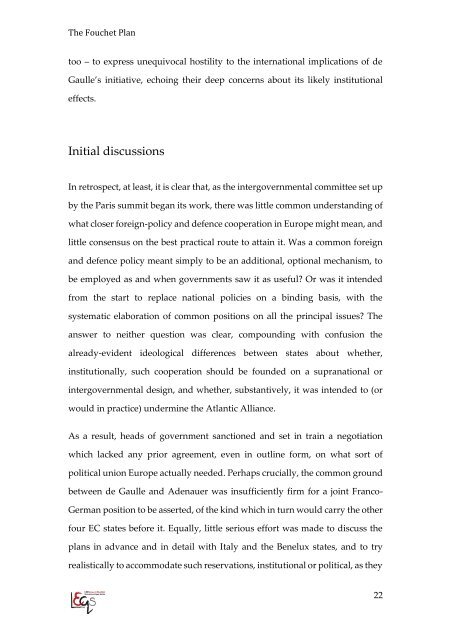The Fouchet Plan De Gaulle’s Intergovernmental Design for Europe
n?u=RePEc:eiq:eileqs:117&r=cdm
n?u=RePEc:eiq:eileqs:117&r=cdm
Create successful ePaper yourself
Turn your PDF publications into a flip-book with our unique Google optimized e-Paper software.
<strong>The</strong> <strong>Fouchet</strong> <strong>Plan</strong><br />
too – to express unequivocal hostility to the international implications of de<br />
<strong>Gaulle’s</strong> initiative, echoing their deep concerns about its likely institutional<br />
effects.<br />
Initial discussions<br />
In retrospect, at least, it is clear that, as the intergovernmental committee set up<br />
by the Paris summit began its work, there was little common understanding of<br />
what closer <strong>for</strong>eign-policy and defence cooperation in <strong>Europe</strong> might mean, and<br />
little consensus on the best practical route to attain it. Was a common <strong>for</strong>eign<br />
and defence policy meant simply to be an additional, optional mechanism, to<br />
be employed as and when governments saw it as useful? Or was it intended<br />
from the start to replace national policies on a binding basis, with the<br />
systematic elaboration of common positions on all the principal issues? <strong>The</strong><br />
answer to neither question was clear, compounding with confusion the<br />
already-evident ideological differences between states about whether,<br />
institutionally, such cooperation should be founded on a supranational or<br />
intergovernmental design, and whether, substantively, it was intended to (or<br />
would in practice) undermine the Atlantic Alliance.<br />
As a result, heads of government sanctioned and set in train a negotiation<br />
which lacked any prior agreement, even in outline <strong>for</strong>m, on what sort of<br />
political union <strong>Europe</strong> actually needed. Perhaps crucially, the common ground<br />
between de Gaulle and Adenauer was insufficiently firm <strong>for</strong> a joint Franco-<br />
German position to be asserted, of the kind which in turn would carry the other<br />
four EC states be<strong>for</strong>e it. Equally, little serious ef<strong>for</strong>t was made to discuss the<br />
plans in advance and in detail with Italy and the Benelux states, and to try<br />
realistically to accommodate such reservations, institutional or political, as they<br />
22


